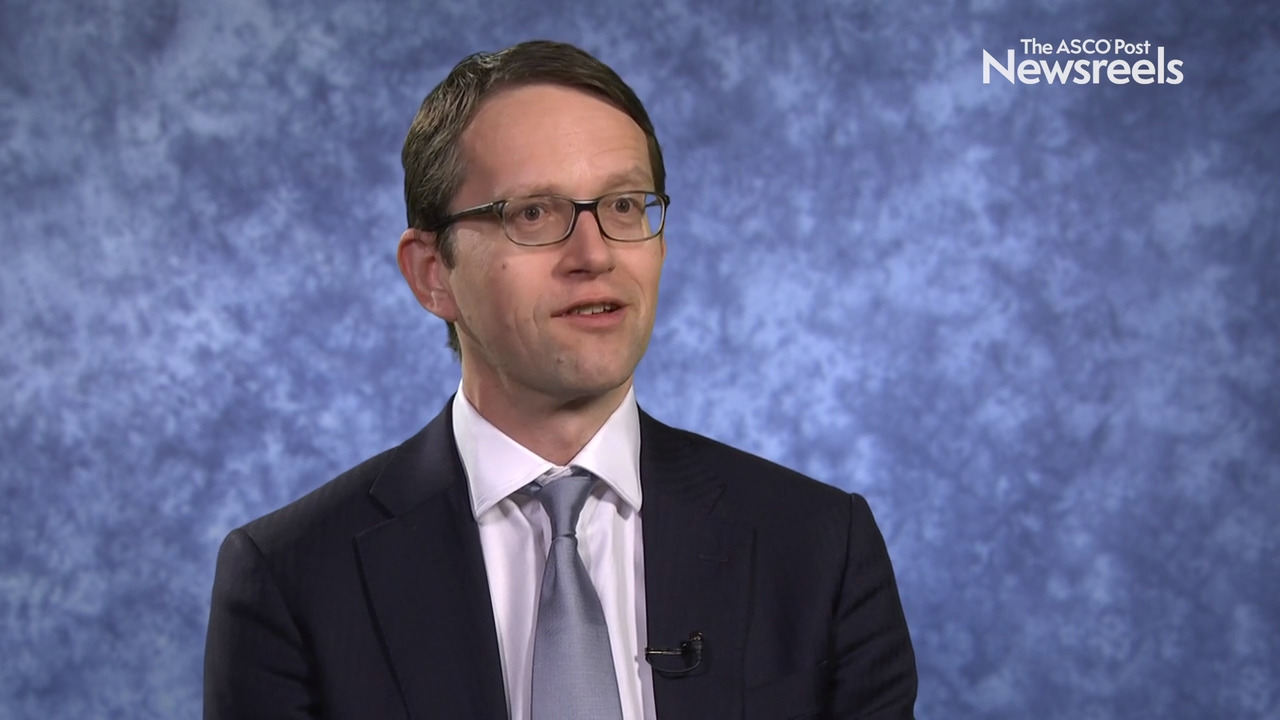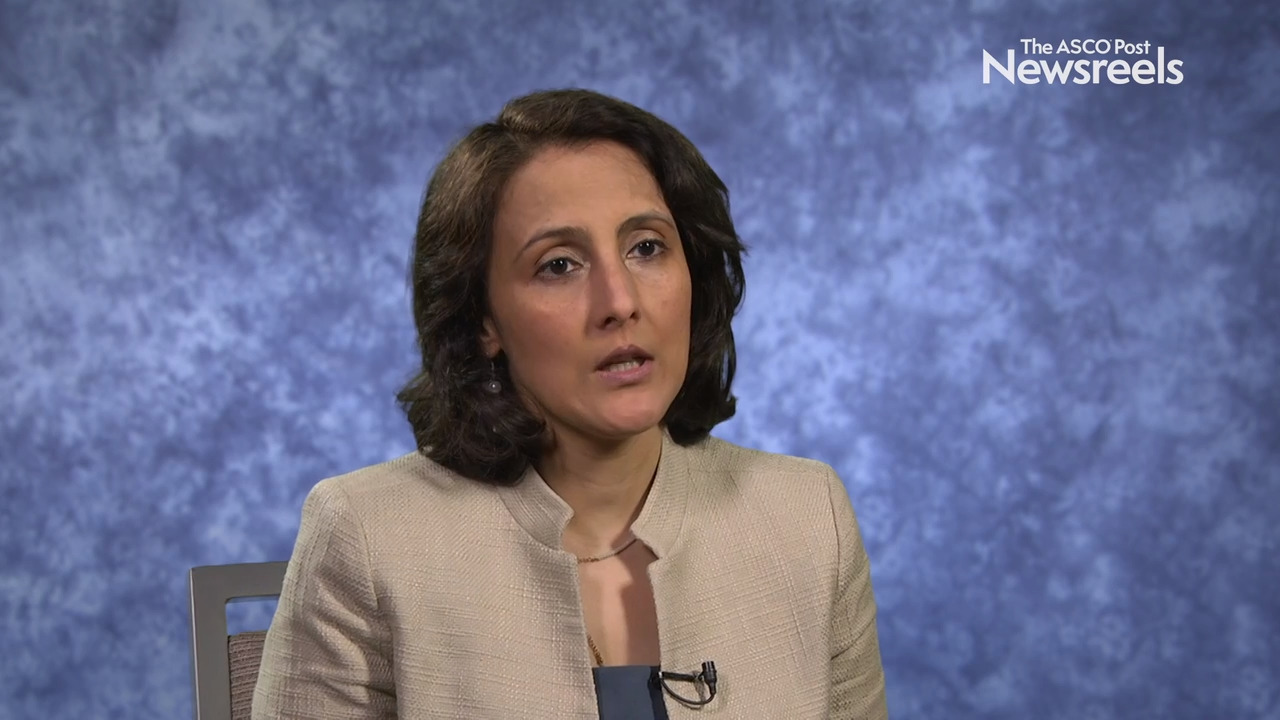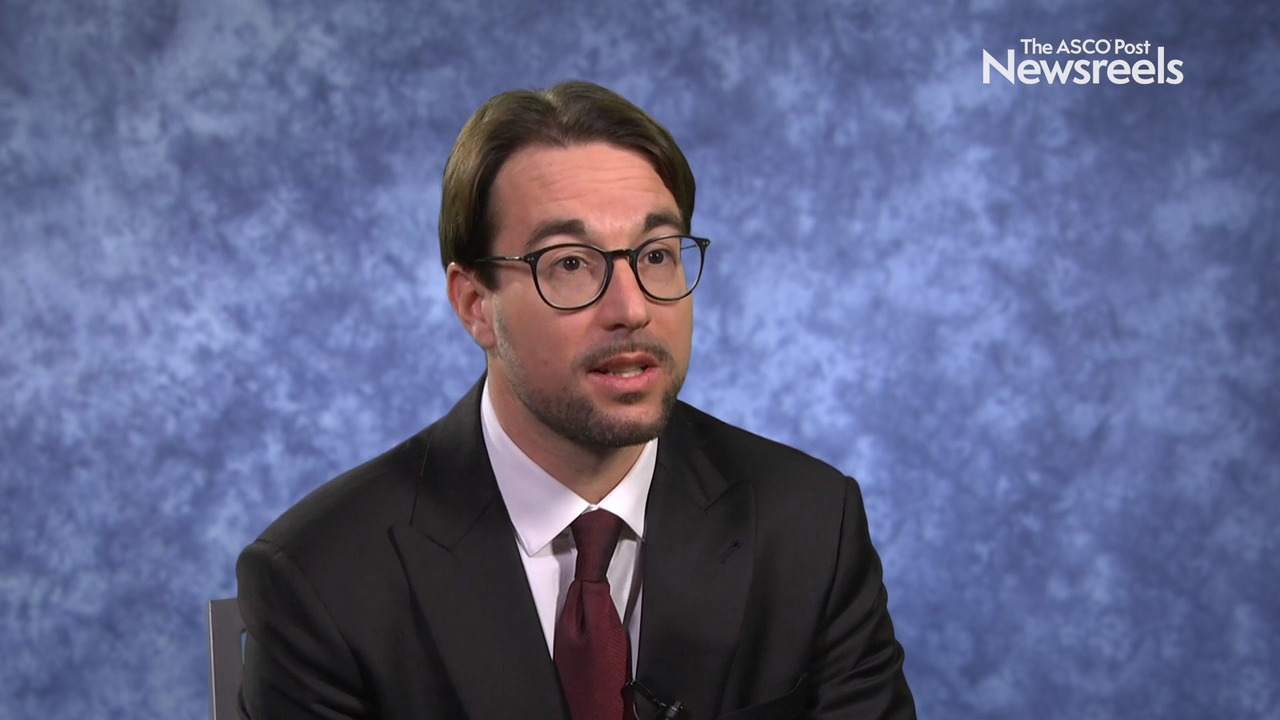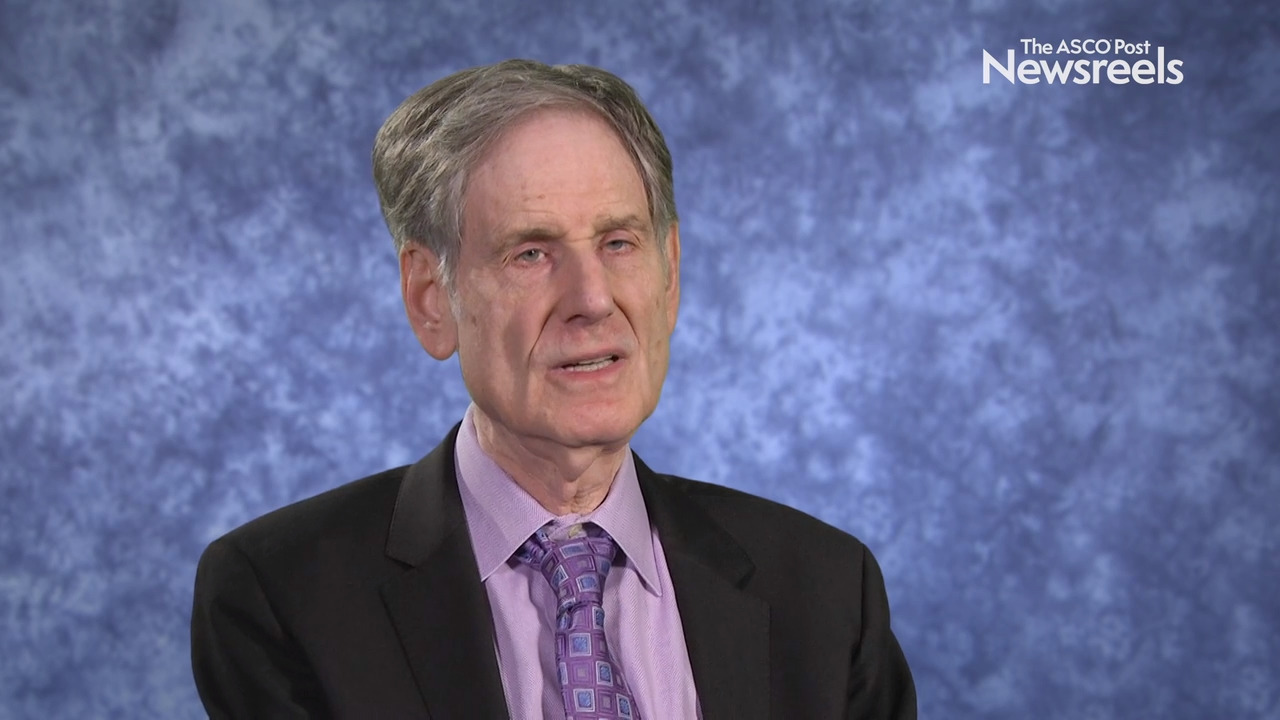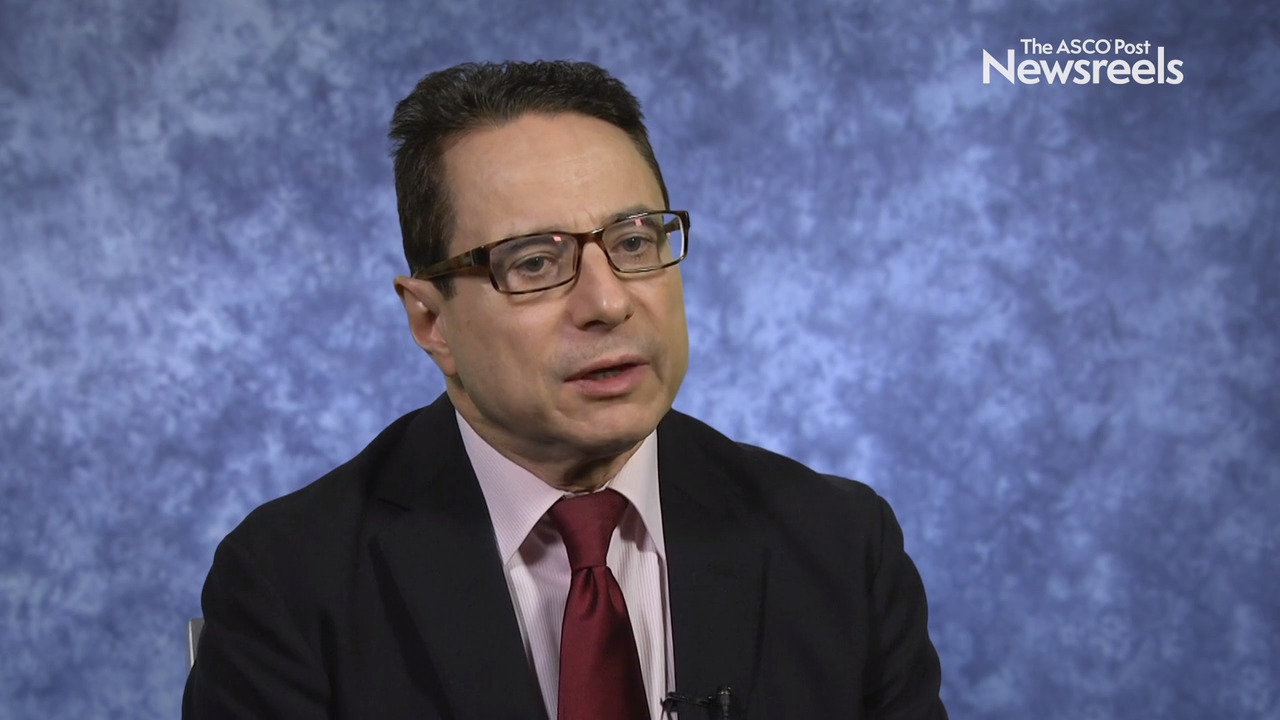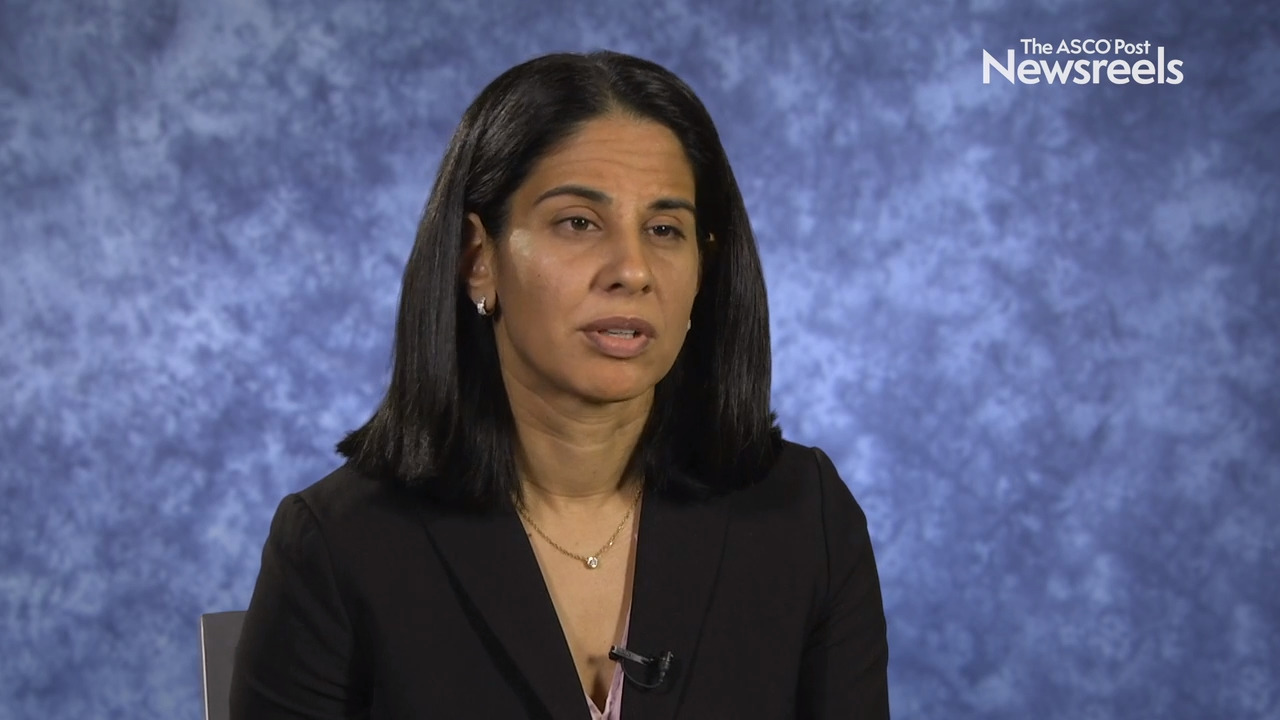SABCS 2019: Residual Cancer Burden After Neoadjuvant Chemotherapy as a Predictive Tool
A large meta-analysis of patients with breast cancer showed that residual cancer burden after neoadjuvant chemotherapy is an accurate long-term predictor of recurrence and survival across all breast cancer subtypes, according to data presented by Yau et al at the 2019 San Antonio Breast Cancer...
SABCS 2019: Breast Cancer Incidence With Estrogen/Progestin vs Estrogen Alone in Postmenopausal Women
A study investigating the long-term influence of estrogen plus progestin compared with estrogen alone on breast cancer incidence in postmenopausal women has found that the menopausal hormone therapies had opposite effects on breast cancer incidence. While estrogen alone decreased breast cancer...
SABCS 2019: ctDNA May Be an Independent Predictor of Disease Recurrence in Patients With Early-Stage Triple-Negative Breast Cancer
The detection of circulating tumor DNA (ctDNA) in patients with early-stage triple-negative breast cancer treated with surgery following neoadjuvant chemotherapy is an independent predictor of disease recurrence, according to a phase II study investigating the potential of using ctDNA to detect...
Nicholas C. Turner, MD, PhD, on ctDNA Testing to Direct Targeted Therapies in Advanced Breast Cancer
Nicholas C. Turner, MD, PhD, of The Royal Marsden NHS Foundation Trust, discusses findings from the plasmaMATCH trial, which showed that circulating tumor DNA testing offers accurate tumor genotyping to identify patients with rare HER2 and AKT1 mutations and may enable matching them with targeted treatments (Abstract GS3-06).
Priyanka Sharma, MD, on Postoperative Treatment of Primary Breast Cancer: POTENT Trial
Priyanka Sharma, MD, of the University of Kansas Medical Center, reviews new phase III data on adding oral fluoropyrimidine to adjuvant endocrine therapy, the current standard of care, in the setting of hormone receptor–positive, HER2-negative primary breast cancer (Abstract GS1-09).
Icro Meattini, MD, on Breast Irradiation After Breast-Conservation Surgery: 10-Year Follow-up Results
Icro Meattini, MD, of the University of Florence, discusses study findings that showed the less-invasive partial-breast irradiation using intensity-modulated radiotherapy after surgery may be an acceptable choice for patients with early breast cancer, as it is cost-effective, safe, and efficacious when compared with whole-breast irradiation (Abstract GS4-06).
Ralph R. Weichselbaum, MD, on Oligometastatic Cancer: The Role of Radioimmunotherapy
Ralph R. Weichselbaum, MD, of the University of Chicago, summarizes a plenary lecture in which he presented data that could guide future clinical strategies: studies supporting the basis and classification of oligometastatic disease, including breast cancer; and basic and clinical data on radioimmunotherapy (Abstract PL2).
Miguel Martín, MD, PhD, on Metastatic Breast Cancer: PEARL Trial on Palbociclib Plus Endocrine Therapy vs Capecitabine
Miguel Martín, MD, PhD, of the Gregorio Marañón Institute and GEICAM, discusses phase III study findings that showed no improvement in progression-free survival with palbociclib plus endocrine therapy vs capecitabine in patients with hormone receptor–positive/HER2-negative metastatic breast cancer whose disease progressed on aromatase inhibitors—although the drug combination was generally better tolerated than capecitabine (Abstract GS2-07).
Sara M. Tolaney, MD, MPH, on HER2-Positive Breast Cancer: ATEMPT Trial on T-DM1 vs Paclitaxel Plus Trastuzumab
Sara M. Tolaney, MD, MPH, of Dana-Farber Cancer Institute, discusses phase II findings on patients receiving T-DM1 monotherapy as adjuvant treatment for stage I HER2-positive breast cancer, a regimen associated with few recurrences in the study population (Abstract GS1-05).
SABCS 2019: Does Treatment With Pembrolizumab Improve Pathologic Complete Response in Patients With Triple-Negative Breast Cancer and Lymph Node Involvement?
The addition of the checkpoint inhibitor pembrolizumab to neoadjuvant chemotherapy and as adjuvant therapy increased the rates of pathologic complete response in patients with triple-negative breast cancer who had lymph node involvement, according to results from the KEYNOTE-522 trial, which were...
SABCS 2019: 6-Year Analysis of the Addition of Pertuzumab to Trastuzumab Plus Chemotherapy as Adjuvant Therapy
Data from the 6-year analysis of the APHINITY trial showed that adding pertuzumab to the previous standard treatment of trastuzumab plus chemotherapy after surgery continued to reduce the risk of recurrence and death in patients with HER2-positive early breast cancer, according to findings...
SABCS 2019: 10-Year Follow-up of Adjuvant Accelerated Partial-Breast Irradiation vs Adjuvant Whole-Breast Irradiation
A 10-year follow-up study of patients with breast cancer who had been treated with accelerated partial-breast irradiation (APBI) after surgery showed that their rates of disease recurrence were similar to those of patients who had received whole-breast irradiation (WBI), according to data presented ...
SABCS 2019: Ribociclib/Letrozole vs Multiagent Chemotherapy in Patients With High-Risk Luminal B Breast Cancer
A phase II study by Gavilá et al evaluating the efficacy of the combination of the CDK4/6 inhibitor ribociclib and the aromatase inhibitor letrozole in combination as a neoadjuvant treatment in patients with high-risk luminal B breast cancer has found that the therapy produced response rates...
SABCS 2019: IBIS-II Study Finds Long-Term Preventive Benefit With Anastrozole Among Postmenopausal Women at High Risk for Breast Cancer
A 10-year median follow-up analysis of the IBIS-II trial on the efficacy and safety of the aromatase inhibitor anastrozole for healthy postmenopausal women at increased risk of developing breast cancer has found that the therapy reduced the likelihood of breast cancer incidence by 50% and had few...
SABCS 2019: Postoperative S-1 Plus Endocrine Therapy for HR-Positive, HER2-Negative Breast Cancer
The postoperative combination of S-1, an oral fluoropyrimidine-based drug, with endocrine therapy improved invasive disease–free survival and 5-year invasive disease–free survival estimates in patients with hormone receptor (HR)-positive, HER2-negative breast cancer, according to results from the...
SABCS 2019: Adding Tucatinib to Capecitabine/Trastuzumab Improved Survival for Patients With Advanced HER2-Positive Breast Cancer
The addition of tucatinib to capecitabine and trastuzumab significantly improved progression-free survival and overall survival in patients with advanced HER2-positive breast cancer, with or without brain metastasis. These findings—from the HER2CLIMB study—were presented by Murthy et al at the 2019 ...
SABCS 2019: [Fam-] Trastuzumab Deruxtecan in Patients With Pretreated HER2-Positive Metastatic Breast Cancer
A phase II clinical study investigating [fam-] trastuzumab deruxtecan (T-DXd) in patients with metastatic HER2-positive breast cancer previously treated with trastuzumab emtansine (T-DM1) showed patients had an overall response rate of 60.9% with the treatment. The study by Krop et al was presented ...
Having Cancer Should Not Make You Homeless
In the spring of 2005, I was launching a new career as a sales consultant for a startup graphics company and wanted to cross off a few essential things on my to-do list, including getting my annual mammogram and physical, before I started my new job. Although I was surprised when I got a call from ...
Trastuzumab Biosimilar HLX02 Shows Activity in HER2-Positive Metastatic Breast Cancer
The trastuzumab biosimilar HLX02—manufactured in China—achieved a similar overall response rate to reference trastuzumab in women with HER2-positive recurrent or previously untreated metastatic breast cancer, according to a large, randomized phase III study. Binghe Xu, MD, PhD, of the Department of ...
2019 Advanced Breast Cancer Award Goes to Fatima Cardoso, MD
The European School of Oncology (ESO), together with the Advanced Breast Cancer Global Alliance, bestowed the 2019 Advanced Breast Cancer Award upon Professor Fatima Cardoso, MD, Director of the Breast Unit of the Champalimaud Clinical Centre in Lisbon, “in recognition of her foresight in...
Study Suggests Association Between Increased Risk of Breast Cancer and Use of Chemical Hair Products
Scientists at the National Institutes of Health (NIH) found that women who use permanent hair dye and chemical hair straighteners may have a higher risk of developing breast cancer than women who do not use these products. The study, published by Eberle et al in the International Journal of Cancer, ...
Promising New Treatments for Triple-Negative Breast Cancer: Immunotherapy and Other Targeted Therapies
Clinical trials continue to demonstrate that combining immunotherapy with chemotherapy and other targeted therapies can improve survival for patients with triple-negative breast cancer, according to results presented at the 21st Annual Lynn Sage Breast Cancer Symposium in Chicago. Nearly 700...
Breast-Conserving Surgery and Partial-Breast Reirradiation in Patients With Ipsilateral Disease Recurrence
Findings from the phase II NRG Oncology/RTOG 1014 trial, reported in JAMA Oncology by Arthur et al, showed that partial-breast reirradiation after second lumpectomy for recurrence of ipsilateral breast cancer following previous whole-breast irradiation was an effective treatment approach and could...
‘Unexpected’ Survival Benefit With Trilaciclib Plus Chemotherapy in Triple-Negative Breast Cancer
An unanticipated result of a randomized phase II study was the improvement in overall survival achieved with the investigational CDK4/6 inhibitor trilaciclib in women with metastatic triple-negative breast cancer. The drug was not being evaluated for its anticancer effects, but rather as a means of ...
FDA Approves FoundationOne CDx as a Companion Diagnostic for Alpelisib/Fulvestrant Treatment in Breast Cancer
On December 4, the U.S. Food and Drug Administration (FDA) approved FoundationOne CDx to be used as a companion diagnostic for alpelisib in combination with fulvestrant for the treatment of postmenopausal female patients as well as male patients with hormone receptor (HR)-positive, HER2-negative,...
Emerging Alternatives in the Third-Line Setting for Metastatic HER2-Positive Breast Cancer
In the post-trastuzumab era, a number of U.S. Food and Drug Administration (FDA)-approved targeted agents for metastatic HER2-positive breast cancer are available, but there is no preferred option for third-line treatment and beyond. At the 2019 Chemotherapy Foundation Symposium, Shanu Modi, MD,...
Associations of Oncotype DX Breast Recurrence Score With Mortality Prediction and Difference Between Sexes
A study comparing the prognostic value of the Oncotype DX Breast Recurrence Score in male and female patients with early-stage estrogen receptor (ER)-positive breast cancer has found that the score is associated with mortality in male patients at a much lower threshold than female patients. The...
Swedish Population Study of Risk-Adapted Screening Starting Ages for Relatives of Patients With Breast Cancer
In a study reported in JAMA Oncology, Mukama et al identified risk-adapted screening starting ages for relatives of patients with breast cancer according to the number of affected first-degree and second-degree relatives and the age at diagnosis of affected relatives. Study Details The nationwide...
ESMO Asia 2019: Trastuzumab Biosimilar HLX02 Shows Activity in HER2-Positive Metastatic Breast Cancer
The trastuzumab biosimilar HLX02—manufactured in China—achieved a similar overall response rate to reference trastuzumab in women with HER2-positive recurrent or previously untreated metastatic breast cancer, according to a large, randomized phase III study reported by Xu et al at the European...
When to Consider Local Therapy for Stage IV Breast Cancer
Local therapy for stage IV breast cancer has not been proven to increase overall survival, yet there are some cases where local therapy could be considered outside a clinical trial. For patients with intact asymptomatic primary tumors, local therapy could be offered if distant disease is well...
Breast Cancer Treatments Targeting Estrogen May Be Putting Patients at Risk for Long-Term Comorbidities
“The majority of breast cancers are hormone receptor–positive, and treatments that target the estrogen receptors are very effective, but they also cause havoc in many tissues that are dependent on estrogen for normal functioning. As a result, breast cancer survivors suffer from ongoing symptoms and ...
ASCO Updates Breast Cancer Risk Reduction Guideline to Include Anastrozole
ASCO has updated a guideline on pharmacologic interventions for breast cancer risk reduction in postmenopausal women at increased risk of developing breast cancer.1 The original clinical practice recommendations for breast cancer risk reduction were published in 1999 and updated in 2002, 2009, and...
Expert Point of View: Charles L. Loprinzi, MD
Charles L. Loprinzi, MD, Regis Professor of Breast Cancer Oncology at the Mayo Clinic, Rochester, Minnesota, discussed this abstract on sexual health in women treated for breast cancer. Addressing patients’ questions, offering advice, and providing appropriate referrals should improve patient care, ...
Study Finds Sexual Health Issues Are a Concern Among Majority of Women With Breast Cancer
Endocrine therapy has been a lifesaver for women with estrogen receptor–positive breast cancer, but decreases in recurrence and cancer-related mortality have come with substantial side effects, according to data presented at the 2019 Supportive Care in Oncology Symposium.1 The results of a...
ESMO Congress 2019: Quick Takes From Key Clinical Trials
The ESMO Congress continues to grow as a pivotal platform for research in clinical oncology. At the ESMO Congress 2019, important findings were showcased in more than 2,200 studies, including 93 late-breaking abstracts. The ASCO Post summarized much of that news in separate articles over several...
Neoadjuvant Immunotherapy Plus Chemotherapy Active in Women With Early Triple-Negative Breast Cancer
Immunotherapy has changed the treatment paradigms for melanoma, lung cancer, bladder cancer, and renal cancer. Now, checkpoint inhibitor therapy is making inroads in triple-negative breast cancer—one of the most difficult-to-treat aggressive types of breast cancer. Late-breaking results of the...
MONALEESA-3, MONARCH 2: CDK4/6 Inhibitors Plus Fulvestrant Benefit Survival in Advanced Breast Cancer
CDK4/6 inhibitors improve overall survival in advanced breast cancer, according to results of two important phase III trials reported at the ESMO Congress 2019. Dennis J. Slamon, MD, PhD, of the University of California, Los Angeles Women’s Cancer Research Program, presented the findings from the...
Prognostic Biomarkers in Triple-Negative Breast Cancer Treated With Adjuvant Doxorubicin/Cyclophosphamide
As reported in the Journal of Clinical Oncology by Priyanka Sharma, MD, and colleagues, biomarker analysis among women with triple-negative breast cancer treated with adjuvant doxorubicin/cyclophosphamide in the SWOG 9313c trial has confirmed a 44-gene DNA damage immune response signature and...
Expert Point of View: Mafalda Oliveira, MD, PhD
Formal discussant Mafalda Oliveira, MD, PhD, of Vall d’Hebron Institute of Oncology in Barcelona, commented that monarcHER was a “well-designed, hypothesis-generating trial that addresses clinically relevant questions,” including whether cyclin-dependent kinase 4 and 6 inhibition now has broader...
Abemaciclib Benefits Patients With HER2-Positive Breast Cancer in monarcHER Trial
Inhibitors of cyclin-dependent kinases 4 and 6 (CDK4/6) are associated with a robust benefit in patients with hormone receptor–positive, HER2-negative breast cancer, but now the monarcHER trial has confirmed their benefit in the HER2-positive population. The new findings were reported at the...
Regional Disparities in Metastatic Breast Cancer Survival Between 1990 and 2011
In a study reported in Cancer, Judith A. Malmgren, PhD, and colleagues found marked regional differences in improvements in breast cancer–specific survival among women diagnosed with metastatic breast cancer between 1990 and 2011, with the best rates found in an institutional cohort. Study ...
Is There a Difference in Breast Cancer Recurrence Rates After Surgery With Regional vs General Anesthesia?
In a trial reported in The Lancet, Sessler et al found no difference in breast cancer recurrence after surgery with regional anesthesia-analgesia using paravertebral block and propofol vs general anesthesia with the volatile anesthetic sevoflurane and opioid analgesia. They also found no difference ...
Scientific Session on Breast Cancer Explores Studies on Partial-Breast Irradiation, Chemoradiotherapy
Women with early-stage breast cancer treated with lumpectomy followed by radiation therapy rated the cosmetic results for whole-breast and partial-breast irradiation to be equivalent, according to a new analysis of results from the phase III NRG Oncology/NSABP B39-RTOG 0413 clinical trial. Results...
Outcomes in Patients With Early Breast Cancer and High 21-Gene Recurrence Score Treated With Adjuvant Chemotherapy Plus Endocrine Therapy: Secondary Analysis of TAILORx
In a secondary analysis of the phase III TAILORx trial reported in JAMA Oncology, Joseph Sparano, MD, and colleagues found that adjuvant chemotherapy plus endocrine therapy produced good 5-year outcomes among women with hormone receptor–positive, HER2-negative, axillary node–negative breast cancer...
Factors Influencing Freedom From Distant Recurrence in Premenopausal Women With Hormone Receptor–Positive, HER2-Negative Breast Cancer
In a long-term analysis of the TEXT/SOFT trials reported in the Journal of Clinical Oncology, Pagani et al found that potential benefits of escalating adjuvant endocrine therapy beyond tamoxifen alone in preventing distant recurrence may be minimal in premenopausal women with hormone...
Long-Term Recurrence-Free Survival With the Addition of Adjuvant Trastuzumab to Chemotherapy in HER2-Positive Breast Cancer
Long-term follow-up analysis of the NCCTG N9831 (Alliance) and NRG Oncology/NSABP B-31 trials, reported in the Journal of Clinical Oncology by Chumsri et al, showed poorer recurrence-free survival in hormone receptor (HR)-negative vs HR-positive HER2-positive breast cancer, with the addition of...
MONARCH 2: Interim Analysis of Overall Survival With Abemaciclib/Fulvestrant in Hormone Receptor–Positive, HER2-Negative Breast Cancer
As reported in JAMA Oncology by George W. Sledge, Jr, MD, and colleagues, an interim analysis of overall survival in the phase III MONARCH 2 trial has shown a significant advantage for abemaciclib plus fulvestrant vs fulvestrant alone in women with advanced hormone receptor–positive, HER2-negative...
FDA Issues Drug Safety Communication on Lung Inflammation Linked to Treatment With CDK4/6 Inhibitors
On September 13, the U.S. Food and Drug Administration (FDA) issued a drug safety communication warning that palbociclib, ribociclib, and abemaciclib—used to treat some patients with advanced breast cancer—may cause rare but severe inflammation of the lungs. The agency approved new warnings about...
FDA Pipeline: Treatments for HER2-Positive Breast Cancer, AML; Breakthrough Device for Prostate Cancer; Statement on Safety Information for Breast Implants
Recently, the U.S. Food and Drug Administration (FDA) granted Priority Review to trastuzumab deruxtecan for the treatment of HER2-positive metastatic breast cancer; granted Fast Track designation for bemcentinib for elderly patients with relapsed acute myeloid leukemia (AML); granted Breakthrough...
Addition of Trilaciclib to Chemotherapy in Metastatic Triple-Negative Breast Cancer
In a phase II trial reported in The Lancet Oncology, Tan et al found that the addition of the cell-cycle inhibitor trilaciclib to gemcitabine/carboplatin chemotherapy did not reduce the duration or incidence of severe neutropenia during chemotherapy in women with triple-negative breast cancer. A...
